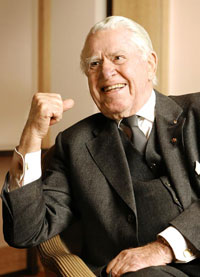Willi Aengevelt
Willi R. Aengevelt (born October 22, 1911 in Düsseldorf ; † November 9, 2006 there ) was a German real estate agent .
Life
In 1928, at the age of 16, Willi Aengevelt joined the real estate company founded by his father Leo Aengevelt on April 1, 1910 , took over its management in 1936 at the age of 24 and was active in operations for a total of 78 years until his death Business active.
Together with the Ring Deutscher Makler , he initiated the adoption of professional standards, initiated systematic training and further education programs and praised attractive prizes for exemplary graduates of the examinations to be held by the chambers of industry and commerce for property and housing management.
In 1969 Aengevelt took his sons Lutz and Wulff into the company AENGEVELT Immobilien as managing limited partners and third generation.
In the 1970s, Aengevelt, together with the "Institute for Housing Industry" at the University of Cologne, was the first in the industry to develop statistically representative real estate indices.
Aengevelt initiated the first public-private partnerships (at that time still called cooperation with the reallocation authority ). Developments in new building complexes could thus be implemented quickly, for example redesigns of Immermannstrasse, Berliner Allee , Tucht-Insel, Centipedes , rounding off the Kö-Galerie and Schadow-Arkaden (Düsseldorf).
In 1979, Aengevelt developed the Langenfeld model, an innovation in the real estate industry, a strictly private-sector development and marketing method for commercial spaces and commercial settlements without the use of public funds. Aengevelt designed the necessary real estate management instruments for land preparation, contaminated site and demolition management, project preparation, project development and successfully implemented the process as a pilot project on two areas in the city of Langenfeld. A total of around 731,000 m² was brokered and around 2,000 new jobs were created in 85 companies. In 1983, the procedure for "public-private-partnerships", which has since been known as the Langenfeld model, was recognized in the 1st Federal Building Land Report as the only financing model for the private law development of privately or publicly owned areas.
In 1990/1991 Aengevelt developed the "Berlin Model". At that time, Aengevelt and his partners from the broker association DIP (German Real Estate Partners) received the order from the Treuhand to develop a utilization method for the marketing of former publicly owned business properties that are no longer required for business. The result was the Berlin model, known in the new federal states with identical content as the TLG model, which then set the real estate markets in East Berlin and the new federal states in motion through 82 national and international tenders. In total, total investments of over EUR 9 billion as well as the creation and maintenance of more than 78,000 jobs in over 400 notarized purchase agreements were contractually secured.
Willi R. Aengevelt's company is one of the founding founders (1993) of the Chair of Real Estate Economics at the European Business School and one of the founding founders and curators (2006) of the University Foundation for Real Estate Management IREBS International Real Estate Business School at the University of Regensburg .
Aengevelt also developed instruments for value-adding, environmentally and urban-friendly land recycling. Here, fallow industrial areas were given new, sustainable uses, for example:
- the HansaPark on the former site of the Thyssen cast steelworks, awarded the environmental protection prize of the state capital Düsseldorf
- the Grafenberg office park with the TTC Thyssen Trade Center
- the ELPRO site in Berlin-Marzahn
- the establishment of the Riebeck-Carrees on the former HASA-tronic area in Halle / Saale
- the conversion of the Kaufring area at Düsseldorf Airport to today's quarter (s)
engagement
In addition to professional activities, Willi Aengevelt devoted himself to promoting and supporting social, societal and scientific institutions, for example the integrative child and youth welfare institution St. Raphael Haus in Düsseldorf, which takes care of the needs and concerns of families, children and young people.
Awards
- the golden merit pin of the Ring-Deutscher- Broker -Bundesverband for his services to the entire profession
- who was appointed honorary member of the RDM district association in Düsseldorf in 1991
- In 1994 he was appointed honorary board member of the RDM regional association in North Rhine-Westphalia
- 1979 Federal Cross of Merit on ribbon
- 1988 Federal Cross of Merit, 1st class
- 1981 the silver plaque of honor from the Düsseldorf Chamber of Commerce and Industry
In 2010, the city of Düsseldorf named a street in the Düsseltal district after Willi Aengevelt.
Web links
| personal data | |
|---|---|
| SURNAME | Aengevelt, Willi |
| ALTERNATIVE NAMES | Aengevelt, Willi R. |
| BRIEF DESCRIPTION | German real estate agent |
| DATE OF BIRTH | October 22, 1911 |
| PLACE OF BIRTH | Dusseldorf |
| DATE OF DEATH | November 9, 2006 |
| Place of death | Dusseldorf |
